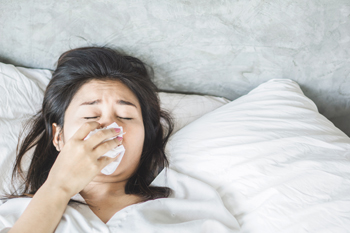You’ve got the flu – now what?

By Amber Daugherty
 Dec. 31, 2019 – You got your flu shot. You’ve been cleaning your hands often. And yet you’ve just woken up with a fever, terrible fatigue and aches that feel worse than any cold you’ve ever had. You’ll probably have to stay home from work or school, but now what? We asked two of our experts – Drs. Mark Downing and Matthew Muller – for their tips on how to recover quickly.
Dec. 31, 2019 – You got your flu shot. You’ve been cleaning your hands often. And yet you’ve just woken up with a fever, terrible fatigue and aches that feel worse than any cold you’ve ever had. You’ll probably have to stay home from work or school, but now what? We asked two of our experts – Drs. Mark Downing and Matthew Muller – for their tips on how to recover quickly.
First of all, you know you’re sick but how do you know it’s the flu?
Symptoms of the flu include fever, cough, headache, fatigue, muscle and joint pains but they can also be milder with just a cough and runny nose. You usually can’t tell the flu from other viral infections but if you have most of these symptoms and it’s flu season, it’s most likely the flu.
Should you go see a doctor?
Immediate treatment of the flu is important for those people at high risk of complications: seniors, babies, people with weak immune systems and people with heart or lung disease. If you are in this category, it’s best to see a doctor soon after a fever starts. If you’re not in this category, you might not need to see a doctor but if your fever persists for many days or you feel sicker over time, it might be a good idea to get checked out either by your family doctor, in the Emergency Department or by calling Telehealth.
How do you get rid of this quickly?
There are a few important ways you can help speed up your recovery:
- Stay home from work or school – don’t share it with anyone else!
- Rest and/or sleep
- Drink plenty of fluids
- Take antiviral medication if directed to by a health care professional
Should you take antibiotics?
No, the flu is from a virus and antibiotics do not work against viruses. Sometimes patients get a complication of the flu with a bacterial infection like pneumonia that may require antibiotics, but this is very rare.
You got the flu shot – so how did you get the flu?
Even in flu season, there are other viral infections that have similar symptoms to the flu (though usually less severe) so what you think is the flu might be something else. Also, after getting the flu shot, it takes a week or two for your immune system to rev up, so if you wait until the middle of flu season to get the shot, it may be too late if you’ve already been exposed to the virus. Finally, like other vaccines and treatments, the flu shot is not perfect – it often only prevents 40 to 60 per cent of flu cases, and is sometimes even less effective – but even if you do get the flu after getting the shot, you’re likely getting it less severely than you would have otherwise.
Looking for more information on the flu? Check this out.
